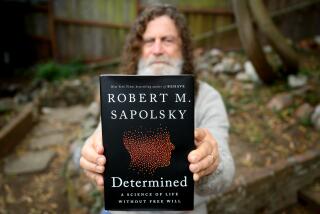The ‘Passive’ Female Is Just Another Fantasy
- Share via
I’m not saying this is good or bad, but there is an insect, a praying mantis to be exact, that decapitates her mate during sex. Reproductively speaking, this is not bad news. The male mantis’s brain acts as an inhibitor of sorts; once it is gone, so is any restraint, and his headless body bends in intense copulatory movements.
Then the female eats him.
Now.
How many of us remember high school biology classes, ones in which we observed the results of Luther Burbank’s sweet pea genetics, dissected fetal pigs and charted the generations of fruit flies? And how many of us came away with the sense that it is the male of any species that drives the engines of reproduction, that females are merely passive participants in the mating game?
In her book, “Sexual Strategies: How Females Choose Their Mates,” Los Angeles science journalist Mary Batten demolishes that notion.
The passive female, she writes, “is a fantasy imposed on biology because men wanted to see females as subordinate.” Batten recounts the experience of one biologist who, while in graduate school years ago, noted that aggression in female mice played an important role in the structure of their society. The biologist was told by his adviser to ignore it: “What females are doing doesn’t really matter.”
Ah, but it does, writes Batten. More and more, biologists who study mating behavior in animals ranging from primates to parasites realize that what females do matters most of all. It is the female of the species that controls which males will reproduce. And reproduction, as Batten reminds us, is the driving force of animal life.
*
Why, other than for titillation, should we care what birds and bees do?
Any biologist can field that one: We should care because humans are animals, too. And the idea that some of our behavior is driven by biology, rather than intellect, helps explain some of our most intransigent questions. To wit:
Why do men try to control women?
Why do men and women fantasize differently about sex?
Why do people who can ill afford children have so many?
Why do women prefer men who drive Porsches?
*
In “Sexual Strategies,” Batten, a writer for television science series and former editor of the journal of the Cousteau Society, draws on the research of sociobiologists, who study the links between social behavior and reproduction.
“According to sociobiology,” she writes, “natural selection favors any behavior that maximizes an individual’s reproductive success. The male bowerbird that builds the most ornate bower, the elephant-seal bull that overpowers his rivals, and the man who drives a Porsche increase their chances of attracting mates and siring offspring.”
Because females have the ultimate power in this regard, says Batten, “males try in every way possible to subvert female choice and control the female’s reproductive biology.”
You thought chastity belts were a human invention?
Some male insects, rodents and reptiles secrete a kind of genital glue after mating that has the effect of plugging the female so a rival cannot inseminate her. One insect, a damsel fly, even has a little scoop on the end of his penis. Before he mates, he scoops out the sperm of the previous male, thus ensuring another generation of life for his DNA.
“Men do not secrete genital glue,” Batten says, “but they use religion and politics and economics to control women’s reproductive biology. . . . Contraception is terribly upsetting to men, in particular, because it gives women control over their reproductive lives and men can’t do anything about it.”
Although it’s hard to know what an ape thinks when he gazes upon a potential mate, research into the human mind shows that men fantasize about how women look, while women fantasize about how men behave. (Example: Men are the primary audience for pornography; women for romance novels.)
To some extent, Batten says, this can be explained biologically: “Males have very little to lose by being visually stimulated . . . I mean, they can inseminate one woman after another, all they are losing is sperm. But it is not to a woman’s advantage to be stimulated solely by the sight of a man. A one night stand for a man can result in a 20-year investment for a woman.”
Lest the hackles of your high consciousness rise, Batten cautions: “This is biology, this is not the influence of culture, or theology or philosophy. This is the animal influence of our past.”
Nor, she adds, are such observations the same as making excuses for sexual exploitation.
“There is nothing in sociobiology that justifies sexism or male dominance,” Batten says. “Sexual difference is a fact, but when someone takes that fact and puts a value judgment on it, that’s wrong.”
From Batten’s perspective, answering the question of why poor people have children they can’t afford to raise is easy: Take away the possibility of meaningful work and economic success, she says, “and the only thing left to them, in biological terms, is reproductive success.”
Humans, of course, have the ability to change the course of nature. Many have plausibly argued that more jobs, and the promise of brighter futures, would translate into a lower teen-age birthrate.
This is what separates us from the praying mantises.
Among other things.







